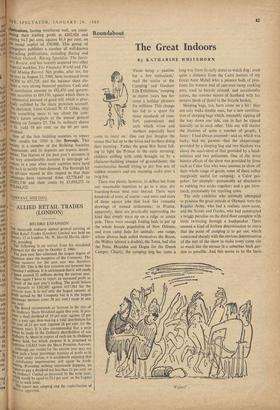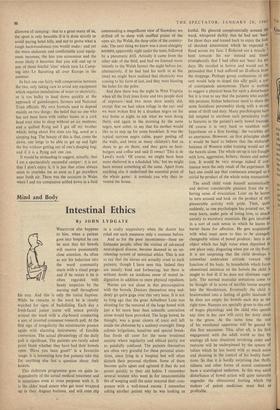Roundabout
The Great Indoors
By KATHARINE WHITEHORN There was plenty, however, to deflect her from any reasonable intention to go to a nice, dry boarding-house next year instead. There were hundreds of tents, of course—and more and more of those square jobs that look like romantic drawings of nomad settlements : in France, apparently, these are practically superseding the kind that simply stays up on a ridge or centre pole. There were enough folding beds to put up the whole female population of New Orleans, and even camp beds for animals : one range, whose diverse beds called themselves the Boysa, the Widesa (almost a double), the Totsa, had also the Petsa, Houndsa and Dogsa for the Dumb Camper. Clearly, the camping clog has come a long way from its early status as watch dog: even quite a distance from the Cairn terriers of my Great Aunt Mabel who, a pioneer both of plus- fours for women and of cast-iron camp cooking pots, used to bicycle around, and occasionally across, the remoter moors of Scotland with her terriers (both of them) in the bicycle basket.
Sleeping bags, too, have come on a bit: they not only make double ones, but a new combina- tion of sleeping bags which, ostensibly zipping all the way down one side, can in fact be zipped laterally on to each other. This one will shatter the illusions of quite a number of people, I fancy : I had always assumed—and so, which was lucky, had my parents—that the chaperonage provided by a sleeping bag and two blankets was about the equivalent of that provided by a head- mistress and two policemen. One of the more bizarre effects of the show was provided by firms such as Calor Gas who were anxious to show off their whole range of goods, some of them rather marginally useful for camping: a Calor gas- poker, for example—presumably an alternative to rubbing two sticks together; and a gas blow- torch, presumably for repelling cows.
The only exhibitor who seriously attempted to produce the great outside at Olympia were the Regular Army, who had a realistic snow-scene, and the Scouts and Guides, who bad constructed a twiggy paradise on the third floor complete with birds twittering through a loudspeaker. There seemed a kind of forlorn determination to stress that the point of camping is to get out, which contrasted sharply with the obvious determination of the rest of the show to make every camp site as much like the terrace in a suburban back gar- den as possible. And this seems to be the basic
dilemma of camping: that to a great many of us, the sport is only bearable if it is done strictly to avoid paying hotel bills, and not to prove what a tough backwoodsman- you would make: and yet the more elaborate and comfortable your equip- ment becomes, the less you economise and the more likely it becomes that you will end up in one of those fearful 'sites' which turn Le Camp- ing into Le Squatting all over Europe in the summer.
In fact one can fairly well compromise between the two, only taking care to avoid any equipment which requires installations of water or electricity, or is too bulky to haul down quickly at the approach of gamekeepers, farmers and National Trust officials. My own formula used to depend mainly on two things: the belief that no one who has not been born with rubber bones or a cork head ever tries to steep without an air mattress; and a quilted flying suit I got off my brother which, being about five sizes too big, acted as a sleeping bag. The beauty of this is that, come the dawn, one longs to be able to get up and light the fire without getting out of one's sleeping bag; and if it is a flying suit one can.
It would be misleading to suggest, actually, that I am a spectacularly successful camper : it is not that I don't enjoy it, it is just that crises always seem to overtake me as soon as I go anywhere near fresh air. There was the occasion in Wales when I and my companion settled down in a field commanding a magnificent view of Snowdon; we drifted off to sleep with muffled praise of the open air, the Welsh, the deep calm of the country- side. The next thing we knew was a most almighty BOOMPH, apparently right under the tents, followed by a pneumatic drill. Actually it came from the other side of the field, and had we listened more intently to the Welsh farmer the night before (or, alternatively, if he had had his teeth in at the time) we might have realised that electricity was coming to his farm at last, and they were blasting the holes for the poles.
And then there was the night in West Virginia when all the fruit trees froze and two people died of exposure—and two more darn nearly did, except that we had taken refuge in the car; and we were woken first by a drunken negro on his way home at night, to ask what we were doing there, and again in the morning by the same negro, now sober, to say that his mother would like us to step up for some breakfast. It was the typical, cartoon negro cabin, paper peeling off the walls, and twice as many children's feet as shoes to go on them; and they gave us ham- burgers and coffee and said (I swear) 'This is de Lawd's work.' Of course, we might have been more sheltered in a scheduled 'site,' but we might have missed something all the same. Apart from anything else it underlined the essential point of the whole game : it reminds you why they in- vented the house.



































 Previous page
Previous page